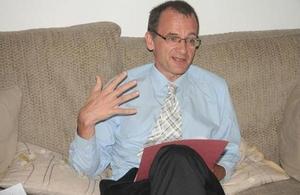British Ambassador to Senegal on Extractive Industry Transparency Initiative
The British Ambassador John Marshall's newspaper article on the Extractive Industry Transparency Initiative

In May this year the UK and France announced that we would sign up to the Extractive Industries Transparency Initiative (EITI), the global standard that aims to increase transparency around oil, gas and mineral resources. The UK’s move came out of our presidency of the G8 this year, where Prime Minister David Cameron has prioritised advancing trade, ensuring tax compliance and promoting greater transparency.
Trade, tax and transparency are issues which are key to prosperity right across the world. They are part of the ‘golden thread’ of conditions that enable open economies and open societies to drive prosperity and growth for all. Transparency and accountability are vital for this. The vision is for revenues from oil, gas and mining to help developing countries to forge a path to sustainable growth, instead of fuelling conflict and corruption.
The EITI, a voluntary approach which aims to set a global standard in this area, was set up in 2003 to help tackle corruption, improve the way revenues from oil, gas and minerals were managed and make sure that people across the world shared in the economic benefits of the natural resources in their country. EITI is relevant to rich and poor alike: from Norway to Nigeria, from Australia to Azerbaijan. The UK, France, the USA and Italy are all now committed to become candidates in the near future, and we hope to see an increasing number of developing countries joining us.
Countries volunteer to implement an EITI process through a coalition of government, companies and civil society (a Multi-Stakeholder Group). The process provides a standard for companies to publish what they pay and for governments to disclose what they receive from extractives. Twenty three countries are already EITI-compliant and another sixteen are candidates.
In Nigeria, which was the first African country to make such reporting legally binding, audits of a ten year period revealed huge discrepancies between reported payments and receipts. This information has so far enabled the Nigerian EITI Secretariat to recover over $US400 million owed by oil and gas companies to the government, allowing these funds to be used to build schools, hospitals and roads. Moreover, EITI compliance raised Nigeria’s profile in the eyes of investors, and the country’s improved credit rating led to significant increases in foreign direct investment.
I am delighted that Senegal is actively seeking EITI membership and welcome the rapid progress that has been achieved in recent months. President Macky Sall signed the decrees in June formally establishing Senegal’s Multi-Stakeholder Group and appointing an Haut Fonctionnaire to lead implementation of the EITI process. On 23 July, having met the eligibility requirements, Senegal applied for candidate status. A decision by the EITI Secretariat on the application is expected shortly EITI membership will bring real benefits for Senegal, helping to ensure that its mineral resources can be fully used to support the country’s development.
EITI is all about responsibility. Governments have a responsibility to ensure that populations benefit from their natural resources. Companies have a responsibility to behave sustainably, supporting the countries in which they operate. And civil society, including the media, share a responsibility to hold both governments and the private sector to account. EITI gives us the tools to do so. As a country with significant interests in the oil, gas and mining sectors in Senegal we look forward to working with industry, government and civil society in support of the EITI.